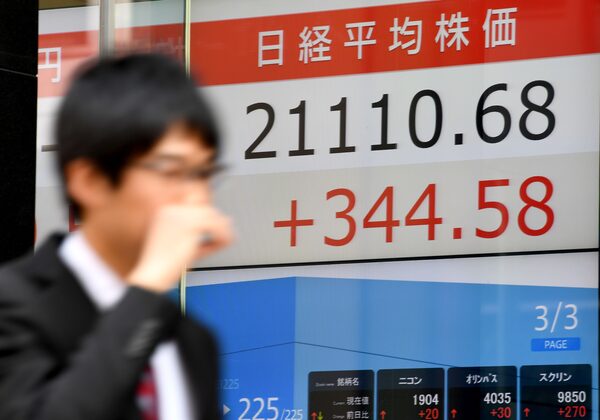
A pedestrian walks past an electronics stock indicator at the window of a securities company in Tokyo, on March 27, 2018.TOSHIFUMI KITAMURA/AFP/Getty Images
Asian shares pulled back on Wednesday as Wall Street was knocked hard on concerns about tighter regulations on the tech industry, denting a brief global equities recovery driven by hopes of easing fears of a trade war between China and the United States.
MSCI’s broadest index of Asia-Pacific shares outside Japan fell 0.4 per cent, with tech-heavy Korean shares falling 1.0 per cent. Japan’s Nikkei fell 2.1 per cent.
On Wall Street, the S&P 500 lost 1.73 per cent and the Nasdaq Composite dropped 2.93 per cent, making their fourth decline in five sessions.
The tech sector were the worst hit as the industry came under more scrutiny, led by a 4.9 per cent fall in Facebook , which has been embroiled in a scandal over the use of data by political consultants.
Nvidia was another weak spot, falling 7.8 per cent after the chip maker temporarily suspended self-driving tests across the globe after an Uber Technologies Inc autonomous vehicle killed a woman.
“There is a sense that there will be more regulations on Facebook or FANG and that the cost of compliance will increase,” said Nobuhiko Kuramochi, chief strategist at Mizuho Securities.
Concerns about trade frictions between China and the United States also remain a drag even after reports of behind-the-scenes talks between Washington and Beijing spurred optimism that U.S. President Donald Trump’s protectionist shift is more about gaining leverage in trade talks than isolating the world’s biggest economy with tariff barriers.
In the currency market, the dollar changed hands at 105.39 yen, not far from Monday’s 16-1/2-month low of 104.56, as the Japanese currency was supported by the risk-averse mood.
The euro lost steam after soft euro zone economic data and comments from European Central Bank policy-makers flagging low underlying inflation.
Economic sentiment in the 19-countries sharing the euro slipped for the third month in a row in March while bank lending slowed.
Erkki Liikanen, ECB Governing Council member, said that underlying inflation in the euro zone may remain lower than expected even if growth is robust, so the central bank needs to remain patient in removing stimulus.
Another member, Jozef Makuch from Slovakia, also struck a similarly cautious tone.
The euro traded at $1.2407, off a three-week high of $1.24765 hit on Tuesday.
Germany’s 10-year Bund yield hit two-month low of 0.500 per cent, having taken a downward shift since hitting a 1-1/2-year high of 0.795 per cent in Feb. 15.
The 10-year U.S. Treasuries yield also dropped to 2.770 per cent, its lowest level in seven weeks. The two-year yield stood at 2.270 per cent.
Oil prices stepped back on a larger-than-expected rise in U.S. oil inventories data from industry group American Petroleum Institute (API) published late on Tuesday.
Brent crude futures traded 0.6 per cent lower at $69.70 per barrel, off Monday’s high of $71.05, which was its highest since late January.